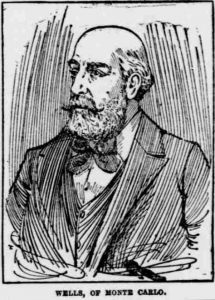Before going to Monte Carlo to break the bank, Charles Deville Wells had committed a large-scale swindle in Britain over a period of several years. In this way he had accumulated a sizeable amount of money, much of which had already slipped through his fingers. Reading about his exploits today we might wonder why he had never been prosecuted: the answer lies in official attitudes towards fraud as a crime, and in the laissez-faire business climate of the time, which favoured minimal government intervention in everyday affairs.
On this day in 1891, the subject of prosecuting fraudsters came up in the House of Commons, when the Home Secretary, Henry Matthews, told Parliament that it was not his intention to pursue those frauds ‘in which a set of rogues and knaves put forward a number of false and fraudulent statements, whilst other people who desire to get large interest join in the scheme, and when they lose their money, come shrieking to the Director of Public Prosecutions to get their money back. I do not agree that the Director of Public Prosecutions ought to be required to spend large sums of money in prosecuting cases of that sort.’
Doubtless, when the “rogues and knaves” in question learned of this policy it simply encouraged them to continue their criminal activities. A magazine called Truth expressed the view a few days later that ‘Mr Matthews went out of his way to say that the law will not punish where there has been fraud on the part of these persons. In doing so he not only gave carte blanche to promoters and their decoys to swindle, but he struck a blow at the monetary enterprise of the country’. It is unlikely that Charles Deville Wells ever read this reply. By the time this issue of the magazine had appeared in print (30 July 1891) he was already in Monte Carlo, making a name for himself at the gaming tables.

THE MAN WHO BROKE THE BANK AT MONTE CARLO : Charles Deville Wells, gambler and fraudster extraordinaire. A newspaper illustration from the 1890s
